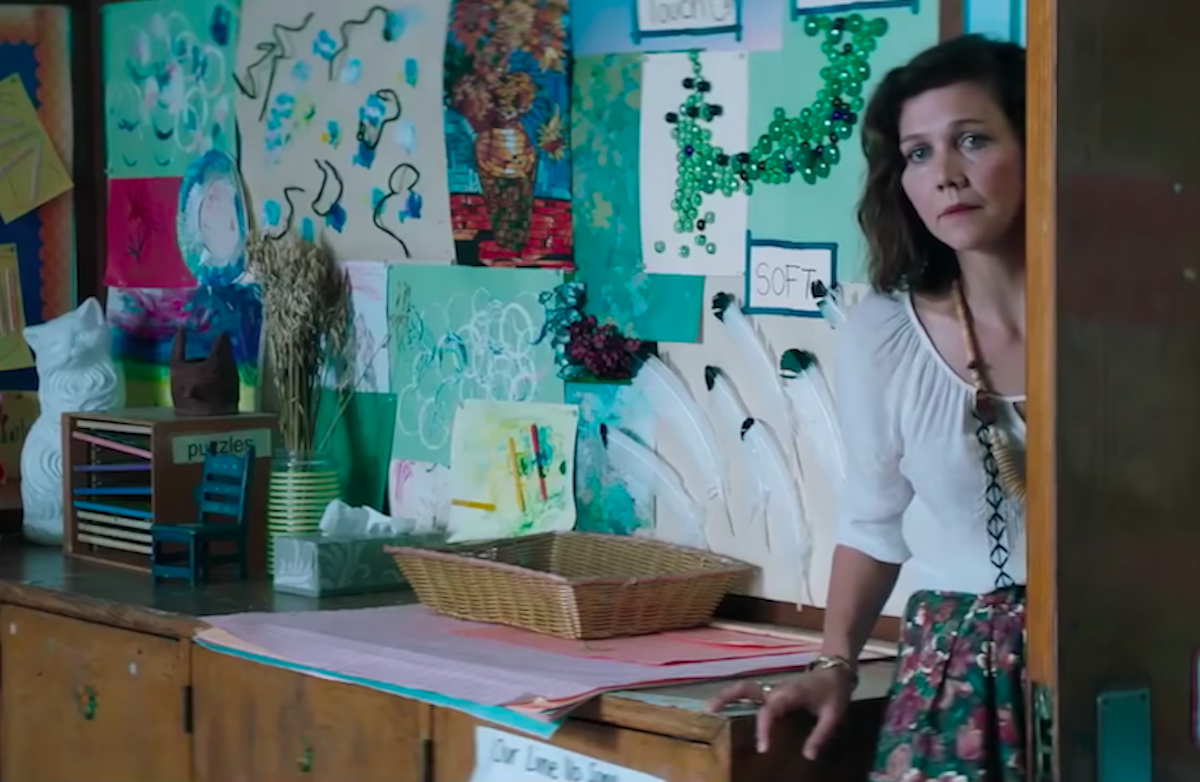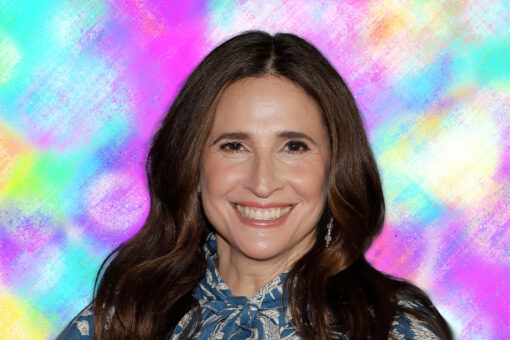When The Kindergarten Teacher, starring Maggie Gyllenhaal, popped up on my Netflix lineup a few weeks ago, I was curious but also a little apprehensive. A remake of an Israeli film by Nadav Lapid with the same title, the drama is about a teacher’s obsession with one of her young students, a 5-year-old boy who has a mysterious talent for poetry. In the Israeli film, the boy’s simple, luminous poems stand in contrast to daily life in a militarized, divided society. While affirming the power of art, the original film also explores art’s role in a complex social and political reality. As I hit play on the new movie, I wondered how it would grapple with these questions as it reworks the story in an American setting.
I’d come across the Israeli version a couple of years back, excited to watch a film from the place where I’d grown up. Right away, I was taken in by its precise and affecting portrait of Israeli society. The kindergarten teacher, Nira, comes from a working-class Mizrahi family, a background that kept her from pursuing her love for poetry when she was younger. Mizrahi Jews, those with origins in the Middle East and North Africa, have faced discrimination and stereotyping in the 20th century. The divisions between Mizrahi and Ashkenazi Jews continue, despite awareness of this history of injustice.
In contrast, Yoav, the young poet, is the son of wealthy Ashkenazi Jews: His father owns a modern, upscale restaurant and doesn’t want his son’s strange talent to stand in the way of a successful career. Yoav’s nanny is a beautiful Ethiopian woman. When Nira has the nanny fired because she doesn’t foster Yoav’s talent, Israel’s complex ethnic hierarchies are underscored once again.
Israel’s militarism and its bitter internal political debates are also central to the film. Nira’s son is serving in the military and appears in his IDF fatigues in several scenes. On the playground, Yoav repeats a classmate’s expletive-filled chant against a rival soccer team. The chant echoes the type of anger that some Israelis direct both at Palestinians and at rival political factions.
The American remake, produced by Netflix and directed by Sara Colangelo, closely follows the narrative of the original: After Gyllenhaal’s Lisa Spinelli discovers her student Jimmy’s precocious talent, she becomes increasingly obsessed with the poems he spontaneously composes and wants to nurture his talent. Much of the dialogue and many of the poems are faithful translations from the original Hebrew.
But even though Colangelo’s film includes political references in its dialogue, questions of class, ethnicity, and militarism — so central to the Israeli version — are relegated to the margins. As a result, the American film jettisons the exploration of poetry as a political, public art, focusing instead on the role of creativity in private life.
Whereas in the Israeli film, the teacher’s interest in poetry is a transgression of the boundaries set by class and ethnicity, in the remake such divisions are largely invisible. Colangelo seemed to have economic class in mind when she set Lisa’s home on Staten Island, but Lisa’s artfully furnished house and boutique-bought bohemian clothes are more Brooklyn than North Shore.
And while there is some ethnic and cultural diversity in the film, Colangelo doesn’t use this diversity to comment on America’s divisions and inequalities. For instance, Jimmy, the precocious boy-poet, is South Asian, but the film doesn’t explore his identity. Lisa’s arrogant and charismatic poetry professor is played by Gael García Bernal and speaks with a Spanish accent. Yet this role could have easily been filled by anyone, as his culture and ethnicity seem incidental to the character and his relationship with Lisa.
By setting aside national politics, class, and ethnicity, Colangelo not only misses an opportunity to engage with these issues creatively, but also departs from the original film’s powerful message about poetry.
In the Israeli film, poetic language disrupts the everyday reality, which is marked by political aggression, class, and cultural divisions. The poems that Yoav composes are simple and incandescent. Their surreal imagery and expressions of tenderness contrast with the monotony and alienation of daily life. Though, for Nira, the poems offer an escape and vicarious self-expression, the filmmakers don’t allow us to forget that this isn’t just Nira’s story. The film suggests that poetry or, more generally, art, is a powerful and unique form of resistance to political oppression.
In contrast, in the American remake, poetry is simply a type of individual self-expression. Lisa’s obsession with Jimmy’s talent results from her thwarted desire to live a more creative and fulfilling life, perhaps as a poet in her own right. In several scenes, Lisa cajoles her family members to follow more creative pursuits. The poetry classes that Lisa attends are much more important in the American version because they represent a gateway to the kind of individual artistic expression Lisa seems to crave. In the Israeli film, the class and other institutions of poetry are more problematic, taking on some of the materialism and aggression that characterize the rest of society.
Don’t get me wrong: Both versions of The Kindergarten Teacher are worth watching. Both are well-made films with beautiful cinematography and strong performances by accomplished actors. In the American version, Gyllenhaal carries the film as a mature, thoughtful woman, driven in equal measures by love and despair. Bernal is as beguiling as ever in his small but important role.
Still, it’s disappointing that the American filmmakers decided to abandon some of the more complex and political elements of the Israeli film. For sure, the role art plays in Israeli society is different from its role in the U.S. Despite its diversity and balkanized politics, Israel is a more cohesive and self-contained country than the U.S. As a result, Israeli artists can communicate ideas and emotions to relatively large audiences in a way that American artists cannot.
Yet there are many American artists, among them poets, who had a transformative effect on American audiences. Think Langston Hughes, Sylvia Plath, or Maya Angelou. Why not imagine such a powerful, political voice in the contemporary context? After all, film, like poetry, opens up a space for the imagination, allowing us to envision new possibilities and ask questions that we might not be able to ask otherwise.



